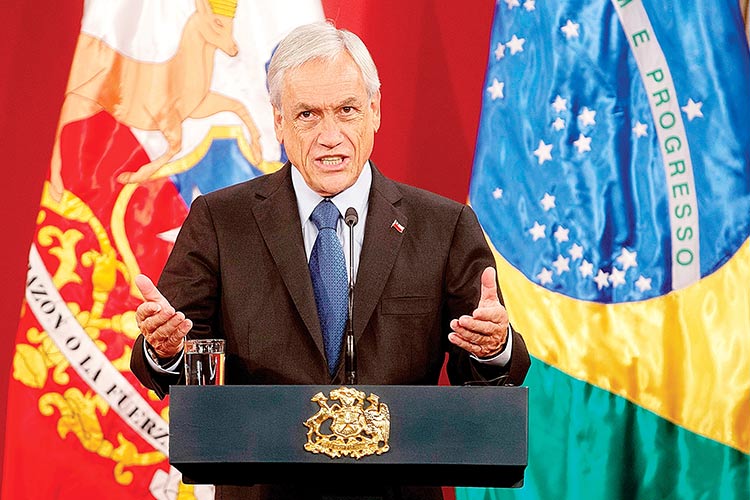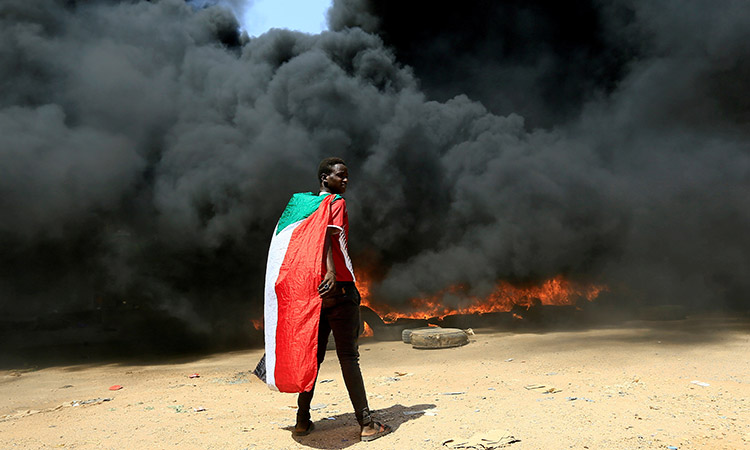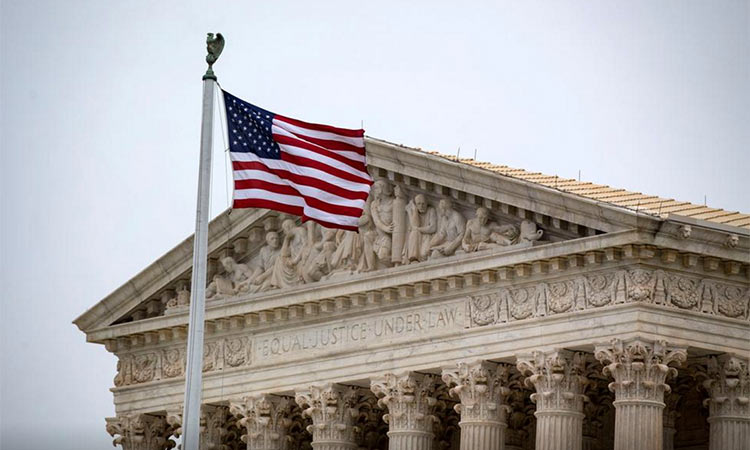Jair Bolsonaro’s US trip was a globalist’s dream

Chilean President Sebastian Pinera speaks during a joint press conference with Brazilian counterpart Jair Bolsonaro at La Moneda Presidential Palace in Santiago, on Saturday. Agence France-Presse
To gauge by the media storm back home, Brazilian President Jair Bolsonaro’s visit to the United States this week fell somewhere between a debacle and a joke. “Victory, yes, but Trump’s,” declared one newspaper editorial. “Never has Brazil been so bluntly and grotesquely humiliated,” raged one critic on my wife’s WhatsApp group. Not even the arrest of Bolsonaro’s predecessor Michel Temer on graft charges helped dilute the fury; a poll this week showed Bolsonaro’s approval ratings down 16 percent from January.
From warring aides to tasteless tweeting, Bolsonaro’s bumbling start has brought plenty to bemoan, but his trip to Washington is not one of them. Leave aside the treacly pro-Americanism and Bolsonaro’s swoon to Donald Trump, and Brazil walked away with a respectable haul between done deals and agreements in progress. True, most of the heftiest perks were promissory, such as boosting exports to the US and Washington’s support for Brazil’s accession to the Organization for Economic Cooperation and Development. Yet even their presence on the table signalled a sharp and salutary turn in bilateral relations that few might have imagined.
Erratic and given to polarising hype, Bolsonaro has been anything but predictable in his first three months. So who knew that despite a foreign minister bent on decrying the evils of “globalism,” his first major foreign policy move was to embrace multilateral institutions such as the OECD and step up in international trade. “This was a victory of the globalist agenda. Bolsonaro’s visit moves Brazil one square on the international game board,” political scientist Fernando Schuler, of the Sao Paulo business school Insper, told me.
“What’s significant is that we’ve broken a four-decade paradigm of distant or conflictive relations with the US,” echoed Marcos Jank, an agricultural trade expert with the Asia-Brazil Agro Alliance, whose markets accounted for half of Brazil’s $102 billion in farm exports last year. “The proximity of Bolsonaro and Trump will boost the economy, even if the immediate agenda doesn’t totally reflect this yet.”
International relations scholar Matias Spektor of the Getulio Vargas Foundation went further. “This is the biggest package of concessions an American president has handed a Brazilian counterpart in the last 30 years,” he commented.
Bolsonaro went to Washington with a long wish list. He came back with a few inked agreements, including the right to discounted US military hardware as a major non-Nato ally, and a bunch of commitments that apparently played to the US agenda. There were safeguards for US technology for commercial launches at a Brazilian launch site and a deal to buy US wheat at zero tariffs. Americans can now visit Brazil without a visa, along with Canadians, Japanese and Australians, a move that irritated nationalists who preferred defending sovereign reciprocity to growing tourism.
It’s telling that the biggest stink in Brazil was over the country’s unlikeliest win: the White House’s imprimatur for Brazil joining the OECD. Yet because the US also conditioned that new status on Brazil giving up its privileges as a developing country under the World Trade Organization, the critics claimed that the blinkered Brazilian leader was swapping benefits for unicorns.
They got it wrong. Brazil has been inching toward the OECD for the last two decades, under governments spanning the political spectrum. By late last year, two months before Bolsonaro came to office, Brazilian authorities had already signed or committed to more than three quarters of the 245 legal instruments required to fully integrate with the group.
The return for Brazil is more than symbolic. OECD accreditation is a badge of good governance. “This isn’t a rich nations’ club but a club of best practices,” said one senior government economist who has worked on the proposal since 2017.
In a new study by the International Monetary Fund, “Brazil: Boom, Bust and Road to Recovery,” trade scholars called the pact a golden straitjacket: “To avoid the mistakes of the past and ensure that future governments do not retreat from commitments to open the economy, the opening should be enshrined in multilateral treaties. In this context, the prospect of Organisation for Economic Co-operation and Development (OECD) accession can foster trade integration and avoid further backpedaling on structural reforms.”
Far from a sacrifice, the quid pro quo of Brazil dropping its claims to special and differential treatment under the WTO is part of the rite of passage. “Once we’ve petitioned to be part of the pact of most developed nations, we can no longer claim special treatment,” said Jank.
In this way, drawing closer to the US opens a path for Brazil to shed the poor-boy indulgences it has outgrown, and which stand in the way of modernizing one of the region’s most recidivist economies. Brazil is among the biggest outliers in the global trading system. With exports and imports kicking in just 25 percent of gross domestic product, it rated as the world’s “second most closed country” from 2012 to 2015, outpacing only Sudan, according to the IMF. Part of that dismal record owes to false security: Steep import duties running 10 percent on average, compared with an average of 3 percent globally, plus sweetheart loans and tax breaks to favored companies.
Such protections were meant to generate jobs and investment and strengthen domestic businesses; instead, they enabled slackers. “We ended up protecting uncompetitive companies which survived thanks to incentives,” Getulio Vargas Foundation economist Armando Castelar told me. Little wonder that Brazil’s productivity and national wealth have under-performed for decades. Between 1980 and 2017, Brazil’s per capita income rose by just 0.7 percent per year, on average, lagging developed countries (where it grew 1.7 percent) and emerging markets (3.0 percent). “At this rate, it will take Brazil 100 years to double its per capita income,” Castelar wrote in the IMF study.
No one is claiming that the Trump administration’s nod to Brazil comes tether free. By giving up developing nation preferences, Brazil indirectly becomes an ally in the White House’s quarrel with China, which clings to its WTO protections.
Playing the useful idiot in a trade war between hyperpowers is risky, not least when Brazil’s traditionally ecumenical diplomacy is in upheaval and its exporters are struggling to widen markets. So it was with much relief and applause that prospective investors heard Economy Minister Paulo Guedes’ vow to nurture trade with the US and China.
In order not to squander those gains, Bolsonaro must press his advantage. One urgent task: pressuring the US to stop blocking the appointment of judges to the WTO’s appellate body for settling trade disputes, which has all but sabotaged the trade pact. “By letting go of our special treatment, we have to demand that the rules of multilateral institutions be strengthened,” said Jank. Upgrades in world diplomacy come with grownup responsibilities.



